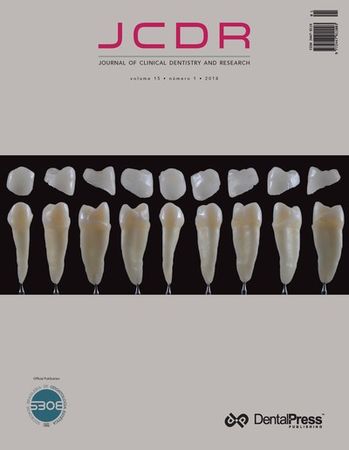Dental students’ knowledge about the risks of bleaching agents self-application
Relato de Caso
Introduction: Changes in dental color is one of the most common aesthetic problems perceived by people. The desire of having white teeth puts dental bleaching as the cosmetic treatment most sought by patients. Objective: the present study analyzed the knowledge about bleaching, its contraindications and the risks of bleaching agents self-application without professional prescription, as well as the frequency of the treatment and the use of commercial products with whitening action by undergraduates in dentistry. Methods: The sample of the study was divided into two groups: G1 - students in...
Autores: Adriana Lemos Mori Ubaldini, Isabela Hrecek Freitag, Ana Carolina Davanço Caviquioli,







When I was invited to write a column in this journal, from the implant-borne prosthesis perspective, I thought, “How could I ever start talking about prosthesis without quickly mentioning implants?” Among the most important steps that must be accurately followed when doing immediate implants is the correct positioning of the fixture. We’ve been repeatedly hearing that every implant placement surgery must be preceded by a thorough prosthetic planning. Unfortunately, despite the need...
Leia mais
nor touch their mineralized structure with another mineralized structure! A tooth does not push another tooth by contact. A tooth does not directly resorb another tooth: there will always be soft tissue interposition, even with the presence of a gap or interface between teeth of which imaging and tomographic examination suggests direct contact between two teeth. Crowding resulting from an imbalance among factors that keep the dental arch stable might be taken as a natural aging-related...
Leia mais
Clinicians who venture to offer aesthetic therapies will have to invariably cope with their patients’ expectations towards the selected treatment option. Expectation is the status invested by patients who wait for a result that shall correspond to their desires. Whenever seeking for aesthetic therapies, patient’s desires involve having more attractive teeth. It is up to the dentist, henceforth, to satisfy this wish and provide patients with a more beautiful smile through the available...
Leia mais
INTRODUCTION In this edition, we shall address a rather trendy topic, related to the most adequate moment to migrate from composite resins to ceramic veneers. According to our philosophy, we firmly believe that aesthetics and functionality must always walk hand in hand, in special when the overall treatment goal is to have long term stability of the treatment. In the clinical case herewith, it was important to have the 20-year follow up of this patient, who happens to be a dentist...
Leia mais
Abstract: The process of light-curing resin-based dental materials is one of the major reasons for clinical failures. However, there is a lack of information and instructions on what is required to achieve an adequate light-curing in different clinical situations. Thus, the present literature review aims at providing a brief background on light-curing in Dentistry and some recommendations to help on different light-curing processes used in the clinical routine on a daily basis.
Leia mais
Objective: To evaluate whether the images obtained outside the area of interest requested by the dentist are important and would modify the treatment plan, aiming to establish the occurrence of incidental findings in all areas of exams requested for evaluation of only one region. Methods: images of 100 cone beam computed tomography exams, requested for different purposes, were randomly selected from a private practice images database. All images were obtained in an i-CAT Classic Cone Beam 3-D...
Leia mais
Introduction: Changes in dental color is one of the most common aesthetic problems perceived by people. The desire of having white teeth puts dental bleaching as the cosmetic treatment most sought by patients. Objective: the present study analyzed the knowledge about bleaching, its contraindications and the risks of bleaching agents self-application without professional prescription, as well as the frequency of the treatment and the use of commercial products with whitening action by...
Leia mais
Introduction: The management of tooth agenesis may be accomplished through space opening or closure. Long term stability and biological compatibility of final outcomes are the main advantages of the aesthetic closure of such spaces. Objective: this paper aimed at presenting a clinical case report in which dental arch length was maintained after space closure. The approach allowed for an adequate facial profile in a young female patient presenting nine tooth agenesis, treated with a simple and...
Leia mais
Abstract: The use of auxiliary instruments for the detection and removal of caries has been more and more widespread in the modern cosmetic and restorative dentistry, as well as the use of resins into single increment in order to decrease the clinical time necessary to perform the restorations. The objective of this study was to present a case report of posterior restoration (class II), associating an auxiliary method (light emission) to the removal of caries and a low contraction resin. In...
Leia mais
Introduction: The search for dental cosmetic procedures associated with the incidence of changes in enamel surface contributed to the emergence and associations of minimally invasive techniques in order to solve these cases. Case report: Presents a conservative approach to reverse aesthetic alterations caused by enamel staining, in which it was decided to associate the microabrasion with a paste of pumice stone and 37% phosphoric acid gel, with in-office bleaching with 35% hydrogen peroxide...
Leia mais
Objective: This study aimed at performing a quantitative analysis of the demineralization potential of dental bleaching gel (35% hydrogen peroxide), compared to 37% phosphoric acid gel, in bovine enamel samples. Methods: fifteen bovine enamel fragments with 30 ± 2mm2) were prepared and divided into three groups (n = 5): group I – saline solution, without bleaching agent; group II – 35% H2O2 bleaching gel applied for three times of 15 minutes each; and group III – 37% phosphoric acid...
Leia maisCopyright © 1998 - 2022 DentalGO | Todos Direitos Reservados. DentalGO é uma marca Dental Press